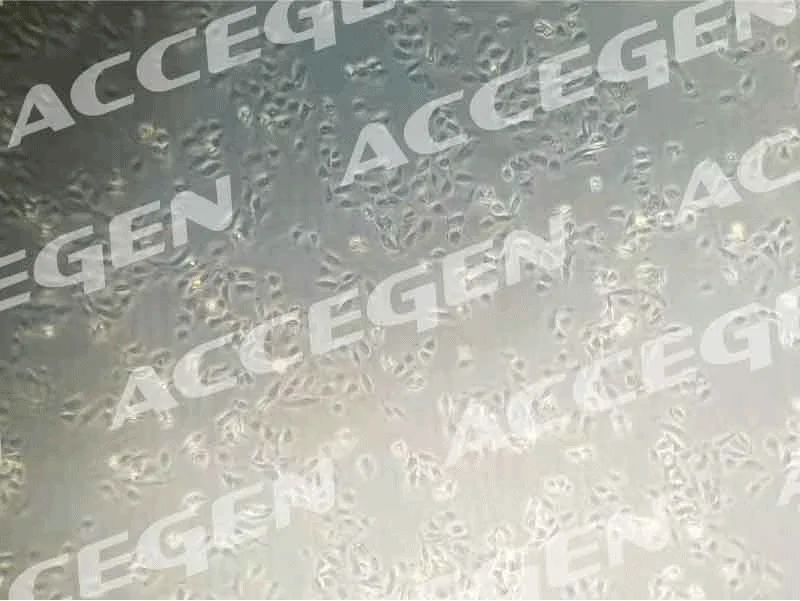- Human Orbital Fibroblasts
- Human Microglia
- Human Pulmonary Alveolar Epithelial Cells
- Human Colonic Fibroblasts
- Human Type II Alveolar Epithelial Cells
- Human Valvular Interstitial Cells
- Human Thyroid Epithelial Cells
- C57BL/6 Mouse Dermal Fibroblasts
- Human Alveolar Macrophages
- Human Dermal Fibroblasts, Adult
- Human Lung Fibroblasts, Adult
- Human Retinal Muller Cells
- Human Articular Chondrocytes
- Human Retinal Pigment Epithelial Cells
- Human Pancreatic Islets of Langerhans Cells
- Human Kidney Podocyte Cells
- Human Renal Proximal Tubule Cells
The Huh-7 cell line has proven to be highly beneficial for in vitro research into hepatitis B, hepatitis C, dengue fever, and hepatoma. Like human cancer cell lines in general, Huh-7 is a mainstay in the study of tumors and the development of drugs to combat them.
Liver cancer research is especially dependent on Huh-7. As hepatoma is strongly linked to chronic viral hepatitis infection (about 85% of hepatocellular carcinoma cases are caused by the hepatitis B or C virus), the Huh-7 cell line is widely used by researchers of hepatocellular carcinoma and other liver cancers. It is likely that future breakthroughs will expand the range of research applications that rely on Huh-7 cells.1
What Are Huh-7 Cells?
Huh-7 is an immortal human hepatic cell line that is highly heterogenous. The majority of these cells have a chromosome number between 55 and 63, with a mode of 60. They are tumorigenic, adherent cells that normally generate two-dimensional cell monolayers.2,3

Figure1. Electron micrograph of AcceGen Huh-7 Cell Line
Where Did They Originate?
The Huh-7 hepatoma cell line originated in 1982 from a liver tumor in a 57-year-old Japanese male. Researchers at the University of Okayama in Japan, including Drs. Jiro Sato and Hidekazu Nakabayashi, are credited with establishing the cell line. This cell line has been routinely used by researchers since its origination.4
Advantages of Huh-7
The Huh-7 cell line has a number of characteristics that make it particularly attractive to researchers.
Although Huh-7 is not the only cell line used in hepatitis C research (others include HepG2, Huh-6, and PLC/PRF/5), it departs from many of these other human hepatoma cell lines in that it can be propagated chemically without requiring the addition of serum, as the cells secrete a growth factor that makes serum unnecessary. This characteristic broadens its scope of research applications as compared with other hepatoma cell lines.5,6
Huh-7 cells are widely used as transfection hosts. Because they are susceptible to the hepatitis C virus, Huh-7 cells have played a pivotal role in the development of drugs to combat HCV.

Figure2. Huh-7 Cell Lines infected by Hepatitis C Virus
One study (2016) indicated that Huh-7 may provide insights for researchers of hepatic drug transporters and the interaction of certain drugs with multidrug resistance-associated proteins (MRPs), and that Huh-7 may provide a superior alternative to human hepatocytes in these research activities.7
Another study (2003) has shown that Huh-7 cells can be modified to enable them to store and secrete insulin in a tightly controlled manner, which points the way to possible future developments in the treatment of type I diabetes.8
The Huh-7 cell line has been used to develop a Cell Line Derived Xenograft (CDX) mouse model that has unearthed valuable insights regarding protein kinase inhibitors and other anti-tumor treatments.9
To encourage the development of studies such as these, AcceGen offers Human Liver Cancer Cell Lines to researchers involved in liver cancer studies and related clinical endeavors.
About AcceGen
Established in 2016, AcceGen is a leading biotechnological company involved in developing and distributing cell and genomic research solutions to organizations and individuals operating in the biotech, cell biology, pharmaceutical, and specialty ingredients fields. AcceGen’s catalog of available biotech resources includes primary cells, stem cells, nucleic acid kits, transfected stable cell lines, immortalized cell lines, agomir/antagomir synthesis services, and much more. The company is currently headquartered in Fairfield, New Jersey.

Copyright - Unless otherwise stated all contents of this website are AcceGen™ All Rights Reserved – Full details of the use of materials on this site please refer to AcceGen Editorial Policy – Guest Posts are welcome, by submitting a guest post to AcceGen you are agree to the AcceGen Guest Post Agreement – Any concerns please contact [email protected]








